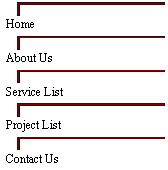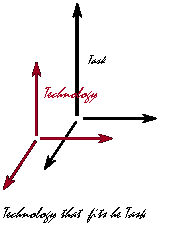
|
Collibrium Technologies |
|
Excellence through Collaboration. |

|
Creating Winning Teams |
|
Coming together is a beginning, staying together is Progress, and working together is success—Henry Ford
Teams that work are central to the way we work. We see our success in creating winning teams. When our project teams win, our clients win, and so do we. Teams’ success can be judged in many ways. The two things we consider most important are: · The team must meat the project’s stated goals. The project goals are what the client needs. The team must meet whatever objective success criteria the client establishes. At the minimum, the projects must be on time and budget and the he client must be satisfied. · The team members should be willing to work again as a team. The way we collaborate with our clients and render our services is guided by a set of organizational values and principles inspired by a model rooted in years of research into group behavior and social-psychology. We call it the Task and Technology Interaction (TTI). At its heart, the TTI is about understanding the project (i.e, tasks) requirements, bringing the right mix of resources (skills, talents, and experiences) to develop project teams and equipping them with tools, techniques, and practices (i.e., technologies) suitable for project at hand. .
The team’s well being functions are equally important as the task functions. In TTI the fulfillment of a team's individual and group well being functions is no more or less important than meeting its production functions. All work teams engage in two broad categories of activities. First are the activities that bring the team closer to completing the assigned task. These activities help the group in meeting the stated goals of the project. When a group or its members engage in such activities we say the group is engaged in meeting its task or production functions. In other words, the task/production functions of a project are the requirements of the task that must be fulfilled for the project to meet its stated goals. Examples of task activities in a software teams are writing code, developing unit tests, integrating the code, doing integration testing, releasing code, conducting functional tests, gathering requirements, etc. The second category of activities are the ones that enable a group in meeting its well being functions. The well being functions (individual as well as group) are the socio-emotional or the maintenance requirements of a group. For a team to function as a cohesive and productive social unit it must attend to it’s maintenance needs. Attempts at improving the communication among the members and advancing inclusion, acceptance, support, and trust would be examples of activities that help a group in meeting its maintenance or well being needs. The production/task and the well being functions are intertwined. Advancement of production functions can help advance a group’s well being functions. However, advancement of well being functions almost always helps in advancing the production functions. At Collibrum a team that meets its stated goals but whose members develop a bad taste about the team is not considered a successful team. Our definition of a winning team is a team that wins on both counts. That is, it meets the project’s stated goals and its members are willing to work as a team again.
Task and Technology Fit Equipping teams with the right technology is vital. Research with teams backed by industry practice shows that the project teams provided with the right tools perform better than the ones who don’t. In TTI “technology” is defined as tools, techniques, and methods that can be brought to bear on the task at hand. Using the right technology for the task goes a long way in meeting the task and maintenance functions of team project. Project teams work on a variety of tasks. Throughout the life of the project they work on many individual , sub-group, and group level activities. Certainly, the tasks vary in their functional and well being requirements. By the same token the technology made available to the teams must differ as well. Therefore, providing the teams with the right technology is critical for the successful completion of tasks. Using the TTI the teams we create are armed with the right tools and task performance strategies. Teams often do not achieve their full potential. The TTI is a comprehensive framework for creating the conditions that are critical for a team to meet its objectives. The framework provides a set of guideline s for defining the make up of a team and helping the team manage their task performance and communication processes. Too often, the teams become unproductive because important questions are not addressed at the outset: What were the criteria for selecting team members? What is the team's purpose and direction? Who holds us accountable for achieving our goals? What are our individual roles and responsibilities? These issues must be addressed upfront for the effort to be successful, but instead they're often neglected or overlooked in the face of people's eagerness to get started. By making sure the teams take care of the matters critical to their success and ward of the forces that result in what has come to be known as “process losses” the TTI serves as a sound framework for guiding the groups in meeting their functional and well being requirements. At Collibrium we consider it a part of our obligations to our clients that we bring the best talent to the project teams, provide the teams with clear direction, infuse balanced accountability and authority, encourage Learning Opportunities, and equip the teams with best practices in task performance and process management.
|

